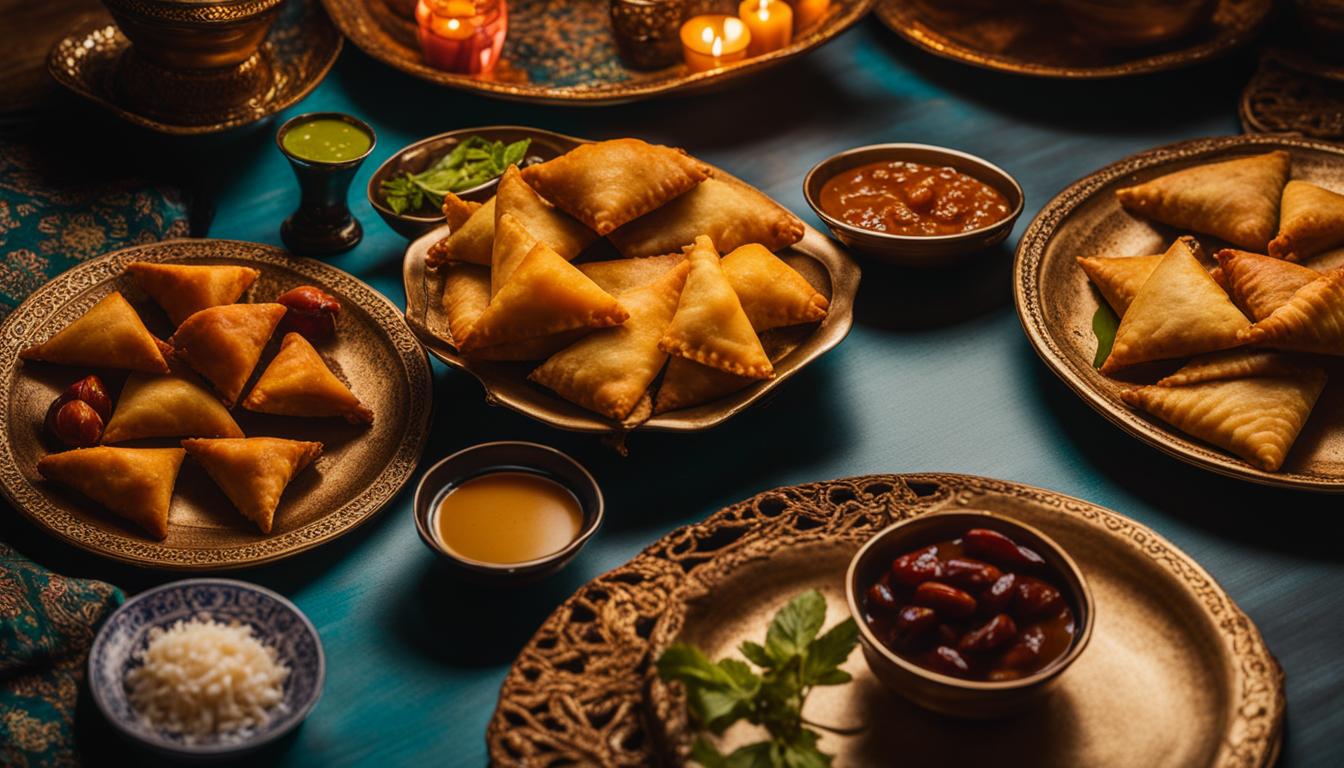Ramadan is the holiest month of the Muslim calendar, during which Muslims around the world fast from sunrise to sunset for 30 days. As a non-Muslim, it is important to be respectful and understanding of this religious observance. Here are some tips on how to participate in Ramadan as a non-Muslim without being insensitive or infringing on the traditions of others.
Key Takeaways:
- Learn about the significance and purpose of Ramadan as a non-Muslim.
- Participate in community iftar meals to engage with the Muslim community.
- Be mindful of your actions and words during Ramadan.
- Educate yourself about Ramadan traditions to foster cultural understanding.
- Support and accommodate your Muslim colleagues and friends during this holy month.
Learn About Ramadan and its Importance
Ramadan is a time of great significance for Muslims around the world. During this holy month, Muslims engage in a period of fasting, prayer, and self-reflection. It is a time when they come closer to Allah and strengthen their faith. Understanding the importance of Ramadan can help non-Muslims approach this sacred time with respect and appreciation.
One of the key reasons why Ramadan holds such immense importance for Muslims is because it is the month in which the Quran was revealed to the Prophet Muhammad. Fasting during Ramadan is considered one of the five pillars of Islam, which are the fundamental obligations for Muslims. By abstaining from food, drink, and other worldly desires from sunrise to sunset, Muslims seek to purify their souls and develop self-discipline.
Moreover, Ramadan is a time for Muslims to reflect on their actions and seek forgiveness. It is a period of intensified prayer and charitable acts. Muslims engage in additional daily prayers, known as Taraweeh, and strive to be generous and compassionate towards others through acts of charity.
The Significance of Fasting in Ramadan
Fasting in Ramadan holds deep spiritual and personal significance for Muslims. It is a way for them to empathize with the less fortunate and develop a stronger sense of self-control and discipline. Fasting also serves as a reminder of the blessings and privileges they have and encourages them to be grateful for what they have been given.
By understanding the importance of fasting and the spiritual journey that Muslims undertake during Ramadan, non-Muslims can approach this sacred month with empathy and respect. It is an opportunity to learn about another culture and religion, fostering greater understanding and appreciation for the diversity that exists in our world.
Participate in the Observance of Ramadan
While non-Muslims are not expected to fast during Ramadan, there are ways to show support and respect for those who are observing the fast. One way to participate in the observance of Ramadan is by attending community iftar meals. Iftar meals are the meals Muslims have to break their fast at sunset, and they often invite non-Muslim friends and neighbors to join them. Attending these meals not only allows you to experience the breaking of the fast firsthand, but also provides an opportunity to learn more about Ramadan and engage with the Muslim community.
Another way to participate in the observance of Ramadan is by educating yourself about Islamic traditions and customs associated with the holy month. This can include learning about the significance of fasting, the special prayers offered during Ramadan, and the importance of charity and acts of kindness. By being more culturally sensitive and knowledgeable about Ramadan, you can demonstrate respect for those who are observing the fast and create a more inclusive environment during this time.
Participating in the observance of Ramadan as a non-Muslim is a meaningful way to show support and solidarity with the Muslim community. By attending iftar meals and educating yourself about Ramadan traditions, you can foster a greater understanding and appreciation for this important religious observance.
Be Mindful of Your Actions and Words
When celebrating Ramadan as a non-Muslim, it is crucial to be mindful of your actions and words to ensure respect and sensitivity towards those observing the holy month. Avoid consuming food or drinks in front of fasting Muslims as a sign of respect for their fast. This small gesture can go a long way in creating a harmonious and considerate environment.
Additionally, be aware of the timing of meetings or events that may coincide with iftar, the meal to break the fast at sunset, or taraweeh prayers. Understanding the significance of these occasions and accommodating them can demonstrate your understanding and respect for the sanctity of Ramadan.
One way to show your understanding and appreciation for Ramadan is to use appropriate greetings such as “Ramadan Mubarak,” which translates to “Happy Ramadan.” This simple gesture conveys your knowledge about the significance of the month and your respect for those observing it.
Learn About Ramadan Traditions
As a non-Muslim, it is important to educate yourself about the various traditions and customs associated with Ramadan. By gaining a deeper understanding of these practices, you can show respect and appreciation for this holy month.
One of the key traditions of Ramadan is fasting from sunrise to sunset. Muslims abstain from food, drink, and other physical needs during daylight hours. This act of self-discipline and sacrifice is a way for Muslims to purify their minds and bodies, focus on their spirituality, and empathize with those who are less fortunate.
In addition to fasting, Muslims also engage in increased prayer, recitation of the Quran, and acts of charity. These activities are central to the observance of Ramadan and reflect the values of compassion, generosity, and gratitude. By learning about and respecting these traditions, you can better understand the significance of Ramadan for Muslims.
Support and Accommodate your Muslim Colleagues and Friends
During Ramadan, it’s essential to show support and understanding for your Muslim colleagues and friends who are observing the fast. By being accommodating and considerate, you can help create a positive and inclusive environment during this holy month.
Flexibility with Work Schedules
Understand that fasting can sometimes lead to fatigue or hunger during the day. To support your Muslim colleagues, be flexible with work schedules and allow for breaks or adjustments to accommodate prayer times. Showing empathy and understanding can go a long way in helping them maintain their religious obligations while balancing work responsibilities.
Offer Assistance
During Ramadan, individuals may experience physical and mental challenges due to fasting. If you notice any signs of fatigue or increased workload, offer your assistance with tasks or assignments. By lending a helping hand, you can alleviate some of the burdens and help create a more supportive environment during this important time.
Show Respect and Sensitivity
Be mindful of your actions and words during Ramadan. Avoid eating or drinking in front of fasting Muslims out of respect for their fast. Additionally, be aware of the timing of meetings or events that may conflict with iftar (the evening meal to break the fast) or taraweeh prayers (additional nighttime prayers). By demonstrating respect and sensitivity, you can contribute to a harmonious and understanding atmosphere for everyone.

Experiencing Community Iftar Meals
One way to join Ramadan as a non-Muslim is by attending community iftar meals. These are the meals where Muslims break their fast at sunset. It’s a wonderful opportunity to connect with the Muslim community, learn more about Ramadan, and engage in conversations with others. By joining these communal meals, you can show support and solidarity, and gain a firsthand experience of the Ramadan traditions.
Engaging in Acts of Kindness and Reflection
Ramadan is a time for self-reflection, prayer, and acts of charity. As a non-Muslim, you can use this time to engage in your own acts of kindness and self-reflection. Volunteer for local charities, donate to causes you believe in, or simply spread positivity and kindness to those around you. By embracing this spirit of giving, you can strengthen your connection with others and create a more compassionate community.
Learning and Growing
Ramadan offers a unique opportunity for personal growth and learning. Take the time to educate yourself about the customs, traditions, and significance of Ramadan. Read books, watch documentaries, or engage in conversations with Muslims to gain a deeper understanding of their faith. This knowledge will not only enhance your experience during Ramadan but also foster a greater appreciation for diversity and cultural understanding.
Conclusion
Understanding how to celebrate Ramadan as a non-Muslim is essential to respect and appreciate this significant religious observance. By learning about the traditions and customs associated with Ramadan, participating in community events, and being mindful of your actions and words, you can show support for your Muslim friends and colleagues during this important time.
Embrace the spirit of Ramadan by engaging in acts of kindness and reflection. Consider volunteering, donating to charities, or engaging in your own spiritual practices. Use this opportunity to connect with others and cultivate a sense of unity and compassion.
Remember, celebrating Ramadan as a non-Muslim does not mean fasting, but it does require empathy and understanding. Strive to create an inclusive and harmonious environment for all during this holy month, and foster a deeper understanding of the values and principles that Muslims hold dear.
FAQ
How can non-Muslims celebrate Ramadan?
While non-Muslims are not expected to fast during Ramadan, they can show support and respect by participating in community iftar meals and educating themselves about Islamic traditions and customs associated with Ramadan.
Should I avoid eating or drinking in front of fasting Muslims during Ramadan?
Yes, out of respect for their fast, it is recommended to avoid eating or drinking in front of fasting Muslims during Ramadan.
How can I be mindful of my actions and words during Ramadan?
Be aware of the timing of meetings or events that may conflict with iftar or taraweeh prayers. Use appropriate greetings such as “Ramadan Mubarak” to show understanding and respect.
What should non-Muslims do to support and accommodate their Muslim colleagues and friends during Ramadan?
Non-Muslims can be flexible with work schedules, allow for breaks or adjustments to accommodate prayer times, and show empathy by offering assistance with tasks or assignments.
How can non-Muslims embrace the spirit of Ramadan?
Non-Muslims can choose to engage in acts of kindness and self-reflection, volunteer, donate to charities, or engage in their own spiritual practices as a way to embrace the spirit of Ramadan.

